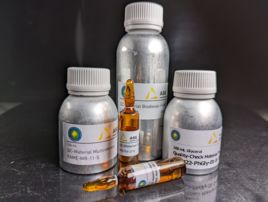Clean engines due to the use of FAME
The project "Formation of deposits and prevention of deposits of biodiesel" carried out at the University of Rostock shows that the use of biodiesel in modern engine systems leads not only to the reduction of greenhouse gases, particles and hydrocarbon emissions but also to the prevention of internal diesel injector deposits (IDID).
The introduction of ever stricter emission limit values requires a continuous development of diesel engine combustion processes. In addition to increasing injection pressures and developing extremely efficient and low-loss injection components, complex injection strategies in particular are used. To implement these strategies, highly functional and complex injectors with gap dimensions of less than 4 μm are necessary.
Low deposits inside these injectors can significantly influence the injector’s operating behaviour and lead, for example, to increased emissions, impairment of injection timing and even severe engine damage due to injectors that are permanently incorrectly injecting or jammed valve needles.
The aim of the project carried out at the University of Rostock in cooperation with AGQM Biodiesel and ERC Additive GmbH was to investigate the tendency of biodiesel and diesel-biodiesel blends to form deposits in these injector-critical areas.
The Diesel Deposit Formation Test (DDFT), which was developed to investigate the tendency of diesel fuels to form deposits, was adapted for use with biodiesel. Biodiesel of various origins (RME, SME, TME, UCOME) and blends of these biodiesels were used in the project. In addition, different diesel-biodiesel fuel blends (B10 to B30) were tested. In particular, the low temperature area up to 180°C, which is typical for the formation of internal diesel injector deposits (IDID) and thus for the critical injector areas, was considered. The test results show that when using biodiesel or biodiesel blends in general no deposits have occurred in the critical low temperature area. Furthermore, the results indicate that the tendency of diesel-biodiesel blends to form deposits decreases with increasing FAME content The higher the proportion of biodiesel, the lower the tendency to form deposits. This deposit-reducing effect can be determined both in DDFT and in comparative test bench investigations in open-loop mode.
In addition to the use of biodiesel, various additives and deposit-forming agents were also examined for their deposit-reducing or accelerating effect. In this way, the deposit-reducing effect of additives could be demonstrated. The results of the project show once again that the use of biodiesel and higher biodiesel blends such as B10, B20 and B30 is already possible today under the current demanding technical conditions in order to significantly reduce greenhouse gas emissions in the transport sector and at the same time avoid internal diesel injector deposits.
The project report can be downloaded here.





